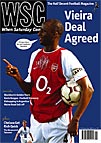 Just one level beneath the Swedish top flight, Assyriska Föreningen are the highest-ranked immigrant-based club in Europe. Marcus Christenson reports
Just one level beneath the Swedish top flight, Assyriska Föreningen are the highest-ranked immigrant-based club in Europe. Marcus Christenson reports
Assyriska Föreningen in Södertälje, south of Stockholm, was founded by Sweden’s Assyrian minority in 1971 with the aim of helping new immigrants settle. The society provided translations and information on the cultural and social aspects of Sweden and created four different sections – culture, youth, women and football – within a few years of its foundation.
The football team had a very inauspicious start, going through Sweden’s seventh division without picking up a point. The players didn’t really mind, however, as the team’s aim was solely to come together every now and then to enjoy a game of the Assyrians’ favourite sport.
The club had reached the fourth division and had to decide whether to continue as an exclusive minority club or to invite players from other backgrounds and aim for the upper echelons of Swedish football. After a lot of soul-searching, they choose the latter – and have never regretted it.
They are now a multicultural team in the Swedish first division, the Superettan, with followers from the Assyrian community around the world. “I get emails from all kinds of different places with people explaining how they follow our games live on the internet and identify with the team,” says marketing director Robil Haidari. Assyriska have kept their name despite players from ten different nationalities – including Swedes, Germans and Iraqis – now playing for the first team and Haidiri says that Assyrian people are very proud of what the team has done in promoting the name of the minority.
There are around three million Assyrians worldwide with the largest community – around one million – living in Iraq. They do not have a strong revolutionary agenda with the aim of creating their own country, but Haidari says that they wish to be more widely recognised as an ethnic minority.
The football team, meanwhile, have given the Assyrian community in Sweden – about 100,000 and the largest in Europe – something to identify with.“Our fans are mainly Assyrian but we have Swedes who are far more fanatical about the team. And part of the reason we have done so well is that everywhere we travel we get support from different minorities, whether Greeks, Italians or Assyrians,” says Haidari.
But Haidari also admits that the club, despite its crucial support from the Assyrians, now see themselves as a Swedish club playing in the Swedish league. “Ours is just a team with a very, very special background,” he says.
From WSC 199 September 2003. What was happening this month